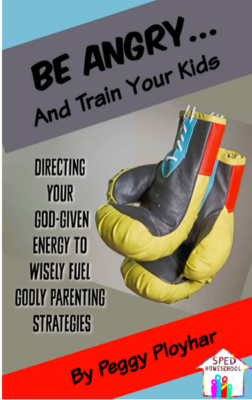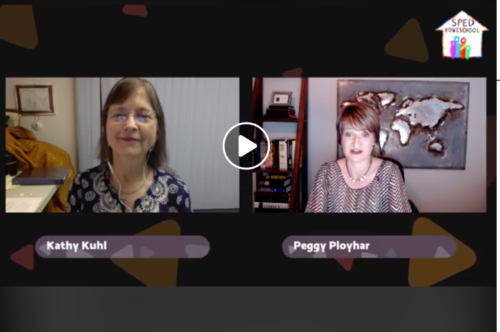Dealing with Parental Anger: Book Review of Peggy Ployhar’s Be Angry… and Train Your Kids

By Kathy Kuhl We parents don’t like to admit our anger with our kids. If our children have learning challenges, we know life is harder for them. So we want to be patient.
Nevertheless, our kids and their challenges can annoy and frustrate us. Deliberately or not, our children sometimes act in ways that trigger our anger.
Peggy Ployhar’s short new ebook uncovers the problem and offers solutions. In Be Angry…And Train Your Kids, she directs us not merely to focus the problem of what they did. Instead, Peggy challenges us first to focus on our own attitudes, to use the opportunity to help our kids mature, and ultimately to rely on God–not ourselves to change ourselves or our kids.
Insights for all
Some of my readers don’t particularly want a biblical perspective. So here are few comments on what Peggy does and does not do in this book, to help you decide if it’s worth your time.

Peggy’s perspective doesn’t mean:
- Berating our kids, or aiming to make them feel guilty. She is frank about her own character weaknesses.
- Using the Bible or anything else as a weapon. Peggy aims to restore relationships.
From her perspective, developing good character is very important. As every parents of a child with learning challenges knows, our kid’s difficulties can be gateways to growing more resilient, compassionate, and persevering.
Using biblical principles, she helps parents to:
- watch their attitudes (not just their kids’ attitudes),
- improve their responses to what triggers anger,
- become better people, and
- strengthen relationships with their kids.
Peggy writes for Christian parents, though others may find it informative. She quotes the Bible and uses biblical imagery and allusions, which she doesn’t always explain. For example, her title is a play on Ephesians 4:26-27, “Be angry and do not sin; do not let the sun go down on your anger, and give no opportunity to the devil.” That’s a key verse to a biblical understanding of anger, as explained next.
Dirty secret: Parental Anger
It’s common for parents to get angry. It’s uncommon to discuss what to do about it.
Anger is not a moral failing, or in Christian parlance, a “sin.” Whatever your theology, it’s easy to see that anger isn’t in itself wrong. What would we think of a person who was blasé about oppression or human trafficking or child abuse? Anger and sorrow are appropriate responses to evil and suffering.
But anger can tempt us to treat others badly.
Escaping the temptation to mistreat others
In part 1 of the book, Peggy discusses how to avoid letting anger poison our actions and relationships. First, she says, don’t the bait: step back, pray and ponder. Don’t focus on the source of stress. Instead, consider:
- Why is this annoying me?
As parents we need to look at our own hearts, not just the situation. “Focus on my own heart “ is the gateway to godly children.”Is my character part of the problem? Do I want to control too much? Parents naturally want to control. But sometimes we want to micromanage. If our aim to raise our children to be independent, eventually, we need to watch ourselves. Am I irritable or mean, because I’m tired or stressed about something else?Do I want revenge? “Vengance is mine, says the Lord” is one expression of another biblical principle underlying Peggy’s approach. Anger may be reasonable, but it’s not any human’s place to get even. - Focus on the underlying problem. What character flaw does this child’s behavior reveal? Character flaws can be small or big. They are serious, but no place for mom or dad to act superior.
Instead, the author suggests we nurture the kind of character we want to our kids to have. Her ideas include:
- Name the virtue you’d like them to develop.
- Spot examples.
- Discuss its importance.
- Don’t use this as a sledgehammer. Watch your own heart.
The point is we want our children to learn obedience, not be perfect. (If our children don’t learn to obey us, how will they learn to obey themselves, when it’s time to pull themselves together and do hard things as adults?)
But how to get them to listen and change?
Part 2: Cultivate child’s heart for instruction
Our children don’t grow up to be kind, wise people just because we do a unit study on character. Peggy says we begin by laying a foundation of trust. If you’ve been blowing up whenever they do wrong, how can they trust you love them? Earn trust back. How?
This was Peggy’s dilemma as she realized her chronic anger with her children had seriously harmed their relationships. She began to work from these principles:
- Humble authority. You must serve your children to lead them.
- Unconditional acceptance.
- Forgiveness and mercy.
Being Judgmental
On this last point, I would have used different terminology. (I understand the author intends to make changes). As parents, it’s our job to judge things wisely.“Is he about to hit his friend with that stick?” “Is she too tired to stay longer at the playground without a meltdown?”
So instead of the author’s usage of “judgment,” here I would say to avoid being “judgmental” or to avoid “snap judgment.” But I agree with her point.
Being judgmental seriously cripples your relationships with your children, and your effectiveness as a parent. I am so prone to this. Instead, Peggy says to hold back long enough to learn the truth. Otherwise “Children to believe mistakes of any kind are not permissible or forgiveable.” Loc 404 of 707.
Has your child done something awful? Don’t assume your child is revealing a malicious nature or has been subject to a bad influence. (I’m guilty of that one!)
Remember we cannot control our kids. Realizing we’re not in control can trigger our anger.
Mending Relationships
Peggy uses the word “mercy” to describe our letting go of our imagined right to control our kids’ lives completely. I’d call it repentance: recognizing we’ve done wrong, and changing our behavior.
And if we’ve been expressing our anger unfairly, or raging against our kids, we need to do more than change our ways. We need to mend the relationship. Then Peggy recommends acts of service to those we’ve hurt or offending.
After she’s been unfair to her kids, and has asked their forgiveness, and been forgiven, she will do a child’s chore for him or her, or some other act of kindness. She calls these acts “re-honoring” because she does them to show she respects the child. When her kids wrong her—disobeying, sassing, whatever—restoring the relationship includes having them do one of mom’s chores.
Time Management and Anger
Time management is not a topic I expected to see in a book on anger. But one reason parents want to control our kids and prevent misbehavior, is that we see them mismanaging their time. For parents of kids with special needs, Peggy notes this is a bigger temptation. So she packs another small chapter full of resources on teaching time management to kids of various levels of ability.
Disclosure and recommendation
Disclosure: proceeds from the sale of this book support the work of SPED Homeschool, a nonprofit I’ve written about SPED Homeschool resources here. I’m serve on the board of this organization. But I only decided to review this book after reading a copy I purchased, without having mentioned the possibility to the author, or anyone else.
I recommend Peggy’s Ployhar’s ebook, Be Angry… And Train Your Kids. I welcome your comments on this topic.
(Also see my blog “When Fireworks Aren’t Pretty.”)


